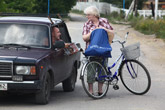What Russian parents want for their child’s future

According to the HSE research, Russian parents want their children to become lawyers, doctors and economists in future. Source: PhotoXPress
Sociologists at the National Research University Higher School of Economics (NRU HSE) have conducted research on the opinion of Russian parents regarding what they want to see their children doing in the future. The results indicate a clear preference for prestigious, “stable” professions and specialist occupations, while creative professions are considered unsuitable because of the lack of financial stability and difficulty in finding future work.
What parents think
According to the HSE research, the professions considered most desirable for their children by Russian parents are: lawyer (24 percent), doctor (21 percent), economist and accountant (19 percent), entrepreneur, military serviceperson, programmer and systems administrator (14 percent), engineer (13 percent), architect and designer (10 percent), and translator (9 percent).
Very few (3 percent) of those surveyed want to see their children represented in the creative professions – as performers, writers, or artists. Slightly more (6 and 7 percent) want to see them as politicians, athletes, journalists, and skilled workers.
As Konstantin Fursov, a researcher at the NRU HSE and the head of the research project, titled ‘Monitoring the innovative behaviour of the population’ explained, in mass consciousness the professions of lawyer and economist are associated with a stable income and career opportunities.
And being a doctor has always been considered prestigious work although it has only now gained popularity among the parents of matriculates. With the development of private medicine and voluntary health insurance, doctors’ incomes have started to increase.
Meanwhile, the only one of these professions in which state personnel queries correspond to supply is doctors. The country’s authorities have increased the number of funded positions in Russian universities in the areas of medicine, engineering and technology, and natural sciences.
According to data provided by the Russian Ministry of Education, in 2013 total matriculation in the areas of economics and management had reduced to 19.8 percent.
According to the sociologists’ data, a quarter of upperclassmen are oriented toward the opinion of their parents when it comes to selecting a profession and one in five make their decision about the future by relying on information published in internet resources.
“Even though most matriculates choose a profession at the direction of their parents, this does not mean that their opinion about themselves and the future coincide,” says Irina Blinnikova, a psychology candidate and employee at the Psychology of Labour Laboratory at Moscow State University.
“Often they just agree with their parents because of their age. But another trend is gaining traction in Russia now; parents are completely refraining from influencing their children and are telling them they should study where they are happy.”
The employment recruitment portal Superjob.ru analyzed the preferences of higher secondary school children and discovered that they choose a profession based on two key parameters: income and the possibility of quickly and easily building a career. The prestige of the profession, social status, self-realization, and the opportunity to help others is important for only one in ten matriculates.
According to Superjob.ru’s data, after finishing their higher education, approximately 38 percent of graduates from economics institutes work according to their specialty, 52 percent from law schools, and 73 percent from medical or healthcare institutes.
According to Blinnikova, in the 1990s Russians preferred to obtain humanities specialties. “In the universities psychology, sociology, and foreign language departments started to be opened en masse,” says the labour expert.
“In Soviet times it was practically impossible to train for these specialties. Humanitarian departments were extremely few in number and only a few entered them. The rest received engineering and technical specialties regardless of their own wishes. In addition, there were not generally such professions as psychologist.”
From humanitarians to officials
In recent years, according to Blinnikova, an opposing trend has developed. “The demand for humanities professions is gradually decreasing. In the first place, this is tied to the oversaturation of the labour market. Employers today need people with a technical profile. Matriculates are slowly beginning to answer to the demands of the labour market. In Soviet times, engineers were treated as people with high status. Slowly but surely, they are becoming so again among Russians.”
The rector of the Academy of Labour and Social Relations, Professor Yevgeny Kozhokin, says that over the past decade a deep social stratification has taken place in the country. According to him, graduates in Soviet times were freer emotionally in the choice of a profession than modern schoolchildren because they operated on the basis of their interests and not so much on how much money they would earn in the future.
“Matriculates have made the transition to market pragmatism. Money has come to play a key role in the choice of a profession. They want to work at a stable job in the future and that is why many of them dream of making a career as an official,” says the professor.
According to Kozhokin, matriculates are entering the engineering profession in poor numbers. “They do not see industrial expansion in the country or chances for the development of this sector of the economy, so they are not confident that they will find a good position after graduating from university.”
Denis Kaminsky, a labour market expert, says that the majority of young specialists fail to think adequately about their future work and career, and for this reason they have a very vague idea about the labour market.
“It is a rare graduate who can name ten leading companies where he would like to work. Most cannot articulate what they would like to do in the workplace. One of the most common answers in interviews (irrespective of the vacancy) is: “I would like to work with people.” But there are few who can explain what this means in concrete terms.
Kaminsky mentions that regardless of specialty, region, gender, age, citizenship, and religious affiliation, there are some places where everyone wants to work - Gazprom, Lukoil, Apple, and Google.
All rights reserved by Rossiyskaya Gazeta.
Subscribe
to our newsletter!
Get the week's best stories straight to your inbox


